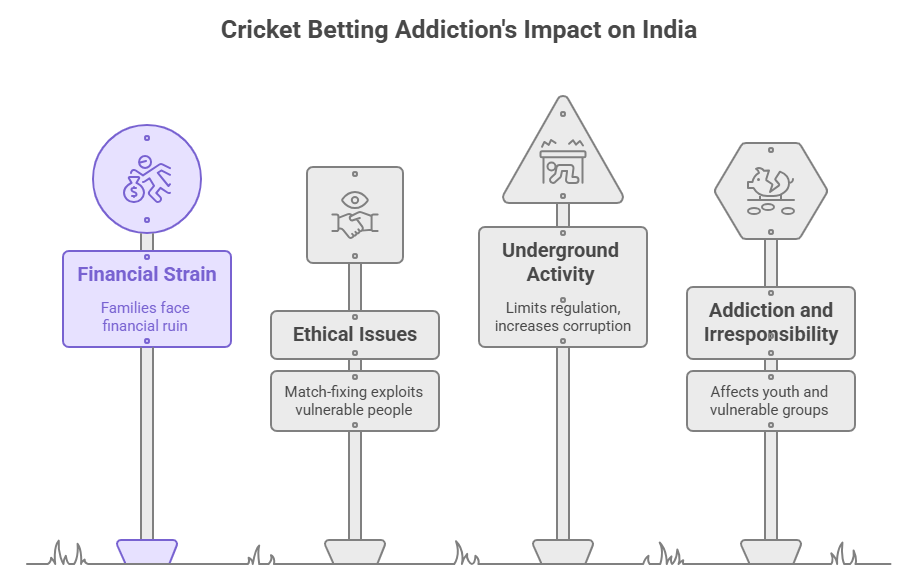Cricket betting is illegal under most Indian state laws and the Public Gambling Act of 1867, which criminalises gambling activities in public places. However, there is no comprehensive federal law regulating online betting, which has led to a complex legal status.
Only a few states, like Sikkim and Goa, have legalised certain forms of gambling and sports betting under regulated conditions. Many online betting sites operate offshore to circumvent Indian laws, making online cricket betting technically not illegal but unregulated within the country.
India has a massive illegal cricket betting market, with billions of rupees wagered on cricket events annually despite the legal restrictions. The explosive popularity of cricket, combined with a lack of regulation, has led to a growing underground betting industry.
For example, in 2016, Rs. 2,500 crore was estimated to have been bet on a single cricket match (India vs West Indies), and Rs. 30,000 crore during the 2016 T-20 World Cup, highlighting the scale and social impact of illegal betting in India, according to George, S.et al’s 2020 study titled “Should Gambling Be Legalized in India?” published in the Indian Journal of Psychological Medicine.
Despite the legal grey areas, there is ongoing debate about legalising and regulating cricket betting in India. Proponents argue that legalisation could generate significant tax revenue and reduce corruption risks like match-fixing, while opponents fear the social harm caused by gambling addiction and illicit activities. The Law Commission has recommended regulation rather than outright bans, suggesting licensed and monitored betting with safeguards to protect vulnerable groups.
Are Online Cricket Betting Sites Legal in India?
No. Online cricket betting sites in India are illegal. Technically, there is no federal law that explicitly bans online betting, including cricket betting, because the main gambling law, the Public Gambling Act of 1867, was made before the internet and only regulates physical gambling establishments.
However, most online cricket betting sites operate legally by being based offshore and accepting Indian users and rupees, thus not violating Indian territory laws. However, individual Indian states have their own regulations; some ban online betting, while a few, like Goa, allow regulated forms.
The Indian government and courts have acknowledged the complexity and need for updated laws to regulate online betting effectively, but currently, offshore online cricket betting is not explicitly illegal for Indian users. However, some betting apps have been banned for violating legal norms. Users should be cautious as legal clarity and regulation are still evolving.
What Requirements Do Legal Online Betting Sites Need to Fulfil?
The core requirements that legal online betting sites need to fulfil are listed below.
- Licensing: An online betting site must obtain a valid license from the relevant regulatory authority to operate legally. This process involves submitting detailed business plans, financial documents, and undergoing background checks to prove operational and financial capability.
- Age Restrictions: Operators must enforce strict age limits, usually permitting only individuals aged 18 and above to participate in betting. This is implemented through identity verification processes during account registration to prevent underage gambling.
- AML and KYC Compliance: Legal betting sites need robust Anti-Money Laundering (AML) and Know Your Customer (KYC) protocols. These include identity verification, transaction monitoring, and activity reporting, which help prevent fraud and money laundering.
- Responsible Gambling Measure: Sites must integrate tools like deposit limits, self-exclusion options, timeout periods, and display warnings for gambling addiction. These measures help protect vulnerable users and promote responsible betting.
- Secure and Transparent Financial Transactions: Online betting platforms are required to use safe payment methods, encryption, and multi-factor authentication to protect users’ financial information. They also must maintain transparent financial reporting to regulatory bodies.
- Fair Play and Fraud Prevention: Operators must ensure fair gaming practices and monitor for fraudulent activities to maintain a level playing field. There should be limits on deposits and withdrawals to reduce fraud risks, and mechanisms to address and investigate complaints of unfair play.
- Reporting and Tax Obligations: Betting sites are obligated to report operations transparently to regulators and submit taxes on both operators’ revenues and bettors’ winnings according to local laws.
- Advertising and Promotion Compliance: Legal sites must comply with advertising restrictions to avoid misleading promotions, limit advertising times, and promote responsible gambling messages.
These requirements form the pillars of a compliant, legal online betting operation. Each ensures the protection of users, the integrity of the industry, and adherence to laws.
Do State Laws Affect Cricket Betting?
Yes, state laws affect cricket betting because betting and gambling regulation is generally a state subject, allowing each state to create its own legal framework and rules. For example, in countries like India and the United States, the legality, licensing, and regulation of cricket betting vary widely from state to state.
Some states fully legalise and regulate it, others prohibit it, and many have different approaches to online versus in-person betting. This results in a complex patchwork of laws, where cricket betting may be legal and taxed in one state but illegal in another. Enforcement, permitted betting methods, and operator licensing rules can differ substantially based on state legislation and regulatory priorities.
Which Indian states have legalised or regulated Cricket betting and gambling?
Below are the Indian states that have legalised or regulated cricket betting and gambling.
- Goa: Goa permits regulated land-based casino gambling and betting. Under the Goa, Daman, and Diu Public Gambling Act, 1976, casinos operate in five-star hotels and offshore vessels, allowing various games of chance, including betting-related activities. Goa is one of the few states where casino gambling and betting are legally authorised and regulated.
- Sikkim: Sikkim has legalised and regulates various forms of gambling, including online casino games and sports betting, such as cricket. The state permits licensed operators to conduct online betting within its jurisdiction, subject to specific regulatory rules, such as the Sikkim Online Gaming (Regulation) Rules, 2009.
- Nagaland: Nagaland permits online skill-based games like poker, rummy, and fantasy sports through its Nagaland Prohibition of Gambling and Promotion and Regulation of Online Games of Skill Act, 2016. It allows regulated online betting on skill games, which include fantasy cricket betting.
- Meghalaya: Meghalaya has a recognised gaming commission and permits casinos, online gambling, and lotteries. It is one of the states with some level of legalised regulation over gambling-related activities, including sports betting.
- West Bengal: West Bengal allows skill-based games such as poker and rummy under its Gambling and Prize Competitions Act, 1957. It also permits regulated forms of online skill games and fantasy sports betting, including cricket.
Other states have prohibitive laws on betting and gambling, particularly online and cricket betting, or allow only specific forms, such as lotteries or horse racing betting.
How Does Cricket Betting Addiction Impact Indian Society?
The cricket betting addiction in India has impacted Indian society by intertwining economic, social, and cultural dimensions. Economically, it generates significant revenue and employment opportunities, particularly through online betting platforms, contributing to government revenues via taxation when properly regulated. Socially, cricket betting fosters community interaction and sharpens cognitive skills through strategic decision-making.
However, it also brings serious concerns such as gambling addiction, financial strain on families, and ethical issues like match-fixing and exploitation of vulnerable populations. The largely illegal status of betting often pushes the activity underground, limiting regulation and increasing risks of corruption and social harm. While many advocate for regulated betting to harness economic benefits and curb illegality, the social welfare challenges remain significant, notably addiction and financial irresponsibility among youth and vulnerable groups.

How do state gambling laws differ across India?
State gambling laws in India significantly vary, as gambling is a state subject under the Constitution. Some states like Goa, Sikkim, and Daman & Diu legally permit land-based casinos, while others like Nagaland and Sikkim regulate online gaming with licensing requirements.
States such as Maharashtra and Gujarat strictly prohibit most gambling except horse racing and lotteries. Meanwhile, states like Andhra Pradesh, Assam, Odisha, and Telangana ban all forms of gambling, including skill-based games.
The laws also differ in how they classify games of skill (e.g., rummy, poker) as legal in some states and illegal in others. The regulatory frameworks, penalties, licenses, and taxation rules differ widely by state, with some promoting licensed gambling while others enforce bans and criminal penalties for illegal gaming establishments.





